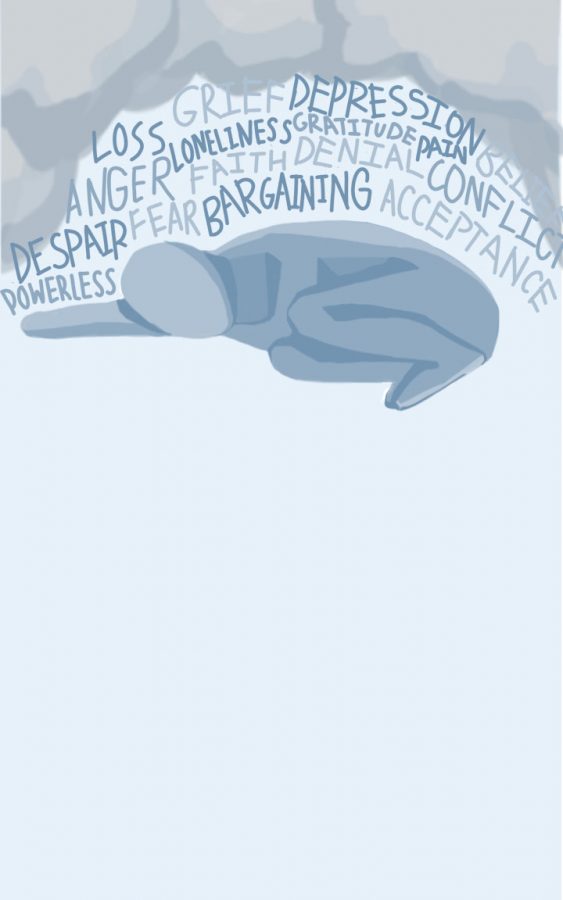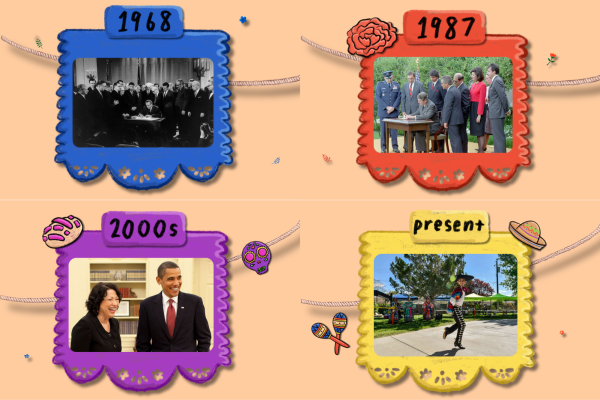Exploring the unique experiences of grief and loss
Graphic illustration by Youqi Huang and Teresa Arisawa
Grief, the feeling of deep sorrow, is an emotion that is deeply linked with loss.
Grief, the feeling of deep sorrow, is an emotion that is deeply linked with loss. Most people will experience grief at some point in their lives due to forces outside of their control.
The five stages — denial, anger, bargaining, depression and acceptance — are a framework often associated with how people experience grief. Elisabeth Kubler Ross, a Swiss-American psychiatrist, introduced the five stages of grief in her 1969 book “On Death and Dying,” which focuses on interactions of terminally ill patients or people who lost someone close to them. She explored the emotions expressed by the people in her study and published her findings.
Denial, the first of the five stages, focuses on the creation of alternate realities in the human mind, in which a person might delude themselves that the traumatic event wasn’t real or didn’t happen. At first, people are shocked by the loss and may believe that the news is inaccurate.
Anger is felt when people are frustrated with their inability to change the past and ask themselves questions such as “what did I do to deserve this?” or “why did this happen to me?” People may redirect their anger and frustration onto others as a coping mechanism. In some cases, people’s faith in their religion may waver because they attribute their loss to external forces.
Bargaining is a result of thinking in “what if” or “if only” statements, causing people to feel guilty over previous actions. Because people often feel helpless or overwhelmed by their loss, they may falsely believe that some sort of negotiation will end the grief and pain.
Depression happens as people start to think about their loss and face the fact that the event has happened. People may feel that there is nothing they want to do, and suddenly life may seem less meaningful. In an attempt to alleviate their pain, people may isolate themselves, resulting in withdrawal and feelings of hopelessness.
Acceptance, which occurs after a person stops trying to hide from the pain, is what helps people deal with grief and understand their emotions. They accept the reality of their loss and realize that they still have a purpose in life and that there is still more to do.
Because each person experiences grief differently, Ross’s five stages of grief is more appropriately viewed as a guide in the grieving process. Not everyone will go through all five stages of grief and in the order listed above.
For example, when he was in seventh grade, junior Evan Morgan* lost his older brother in an accident. Strong emotions bombarded him when he first heard of the news.
“I was devastated and in complete shock,” Morgan said. “The fact that I could not see my brother anymore really frightened me at the time. I never got to say goodbye. I still remember the night before. I was walking back into my room, and I saw my brother quietly working on some sort of project. I never knew that would be the last time I would ever see him again.”
Over time, Morgan’s grief lessened with support from family and friends along with his middle school’s counselor, whose office he visited every day. Although Morgan is coping much better with his grief now, he says that he will never fully recover from it.
“There will be times when I am reminded of this incident, and I will get slightly sad,” Morgan said.
Morgan didn’t go through the denial, anger or bargaining stages of grief. Instead, his grieving process focused mostly on the depression and acceptance stages.
“I used my brother as motivation to strive and become better,” Morgan said. “I always tell myself that I am living my life not only for me, but also for him.”
On the other hand, senior Jesse Kim* suffered from a relationship problem and ended up deeply hurting his partner. In contrast to Morgan’s situation, Kim went through the last four stages of grief: anger, bargaining, depression and acceptance.
“I was mostly angry at myself for not being more patient,” Kim said. “I tried to start talking to her again, but it didn’t really work. Both of us felt iced off, and I stopped and fell through depression for a few weeks.”
Kim experienced anger, bargaining and depression over the span of a couple of weeks but recovered after spending time to find new hobbies and interests.
“Eventually, I realized how messed up my life became, and I set up a schedule to force myself to go outside and veer away from what I was previously doing with my life,” Kim said.
In 2018, one of freshman Flynn Clark’s* best friends fell unconscious during P.E. class before passing away the same week. Clark experienced denial before accepting her reality.
“She fainted during school hours, and our whole class and school grieved as a whole for three days before receiving news of the loss,” Clark said. “I was shocked. I couldn’t believe it. The event happened on Thursday during lunch, and by Sunday, she was gone. Everyone on campus was making paper cranes based on an old Japanese legend that if you have 1,000 paper cranes, one wish will come true. We achieved our goal on Monday during lunch, but [she] never got the chance to see it .”
Clark’s teachers started to worry about her more because of her reputation for fainting in class, and she distracted herself by going to the gym more often.
“I didn’t need to exercise more, but the distraction and the constant will to do something kept my mind focused on one thing rather than reminiscing on what had happened,” Clark said. “I was able to take my mind off the fact that I had just lost a friend, and I was able to start to move in the direction of acceptance.”
When people are grieving, the mind and body are heavily impacted by emotions surrounding a loss, making normal tasks like school much more challenging.
“We can be bombarded or surprised by powerful emotions or thoughts of the loss or person, which can be really inconvenient if you’re trying to take a test,” school psychologist Jack Neudorf said.
Additionally, grief makes it harder for people to continue with the familiar routines that define their lives. Although, in some cases, it may help people change for the better.
“After her passing, I started to show more gratitude for life,” Clark said. “Knowing that I could lose all of it made me appreciate what I had. I was becoming less moody and more caring at home.”
Some prevalent misconceptions about grief are that it is only triggered by death, it is analogous to depression, or people can immediately return to their previous state after grieving.
“People’s expectations about grief is that it is a hill you climb, and then you’re done, as opposed to grief being more recurring,” school psychologist Brittney Stevens said. “There’s the belief that people process the loss, snap back to normal and move forward.”
Some think that everyone expresses grief the same way.
“Others think that people will look very depressed and that their grief won’t manifest in other behaviors or feelings,” said Stevens. “It can look like sleepiness, anger, outrage, short temper or withdrawal. People’s grief causes them to make extreme decisions that they wouldn’t necessarily make if they were feeling more balanced.”
Although people may never fully overcome a loss, they may heal over time.
“My advice for those who want to support someone who’s grieving is to not stay away,” Stevens said. “[Other’s grief] makes us feel fearful that another person is so sad. We feel like ‘I don’t want to upset them more. I don’t want to say the wrong thing.’ It’s almost always better to say something, even if it’s just ‘I’m so sorry you’re sad. I’m so sorry this happened.’ Being together is a real human kindness that we can do for each other.”
Additionally, it is integral for one to continue with everyday routines in order to recover from the loss.
“We tend to neglect basic self care like getting enough sleep, food, hydration and exercise,” Neudorf said. “The more that somebody can be put on autopilot and take care of themselves, the better equipped they are to deal with the ups and downs of the grieving process.”
It is important to remember that grief is an emotion which many feel throughout their lives, and not a feeling that should be rejected or ignored.
“One thing that can be lovely about grief, if you allow yourself to feel it, is that you can be broken open, and that lets light in,” Stevens said. “I find that when people don’t grieve after they’ve experienced a loss, they eventually will in some way.”

Stella is a senior and this year's photo editor for the Epic. Outside of class, she is usually playing mobile games, procrastinating or sleeping. She likes...

Elliu Huang is a senior and is looking forward to one last great year on staff. He hopes to continue counting sheep and practicing the art of weaving plastic,...

Audrey Wong is a senior and Managing Editor for Epic. She loves learning new languages, cooking/baking and photography. She is interested in octopus, cuttlefish...








































































